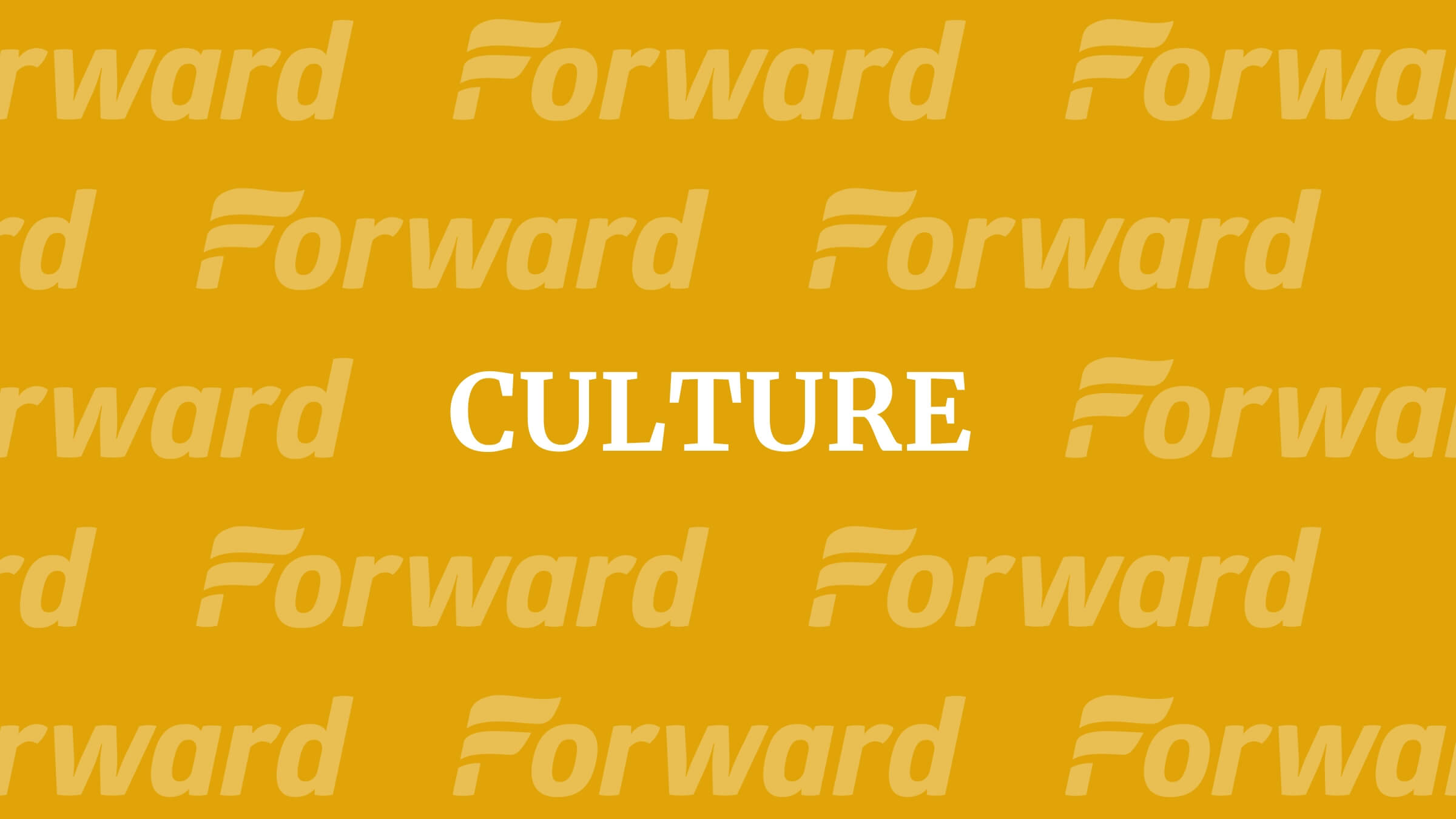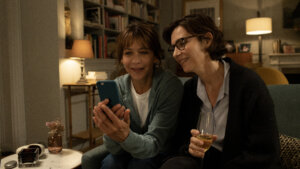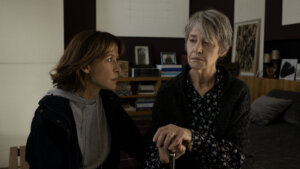In a brilliantly performed film, a great Jewish narcissist seeks death with dignity
François Ozon’s ‘Everything Went Fine’ is an unnerving account of assisted suicide

Graphic by Angelie Zaslavsky
Everything Went Fine, the latest film from French director François Ozon, is a personal and unnerving account of assisted suicide. Based on Emmanuele Bernheim’s autobiographical novel, it depicts her ambivalent relationship with her father Andre, a wealthy industrialist and art collector, during his final days in the early 2000s. It’s Ozon’s tribute to his friend Andre and to Emmanuele, his screenwriting partner (Swimming Pool, Under the Sand) who died in 2017.
The movie brings to mind Ondi Timoner’s documentary, The Last Flight Home, an equally raw and riveting exploration of a Jewish family dealing with its aging and infirm patriarch’s commitment to ending his own life and asking his children to aid him. Both are devoid of sentimentality and sensationalism. Both are true. Both pack an emotional wallop.
Still, there are subtle variations. The documentary traces the discussions, conflict and resolution as it occurs. The viewer witnesses the suicide in real time. There’s immediacy and urgency.
Everything Went Fine, a narrative feature, takes a backward glance, and it’s a fictionalized account even if inspired by a true story.
The real people’s names have not been changed. Emmanuele is played by Sophie Marceau, Andre by André Dussollier. At the same time, the viewers never forget that they’re watching brilliant performances by actors playing roles, affording the audience a more complex and comprehensive experience than the documentary. A domestic drama, the film delves deeply into family dynamics and characters, most pointedly its patriarch, who is singular and off the grid.
The story is set in an affluent and cultivated Parisian world. Andre, 85, favors Brahms’ piano sonata. Even though a devastating stroke has rendered half his face distorted and paralyzed, he speaks to his daughter about gallery exhibits she has attended. His estranged wife is the well-known sculptor Claude de Soria (Charlotte Rampling) who, suffering from advanced Parkinson’s Disease, still spends much of her time in her studio. Emmanuele is a novelist; her younger sibling, Pascale (Géraldine Pailhas), has dedicated her life to Nazi-era provenance research, tracing looted musical instruments and other related materials.
Andre is a contradictory personality, tortured and demanding, charming and abusive, always charismatic. Throughout his married life, he has had many male lovers, but he remains attached to his wife as she is to him. Still, mutual distaste and contempt are never too far beneath the surface. At one point, he compares Claude to her cement sculptures — already dead. It’s an especially brutal comment as she is immobilized and mostly silent.

Still, he speaks with impunity and is denied nothing. So, when he asks Emmanuele to help him end his life she knows his request is not up for debate. Although assisted suicide is illegal in France, it is legal in Switzerland and Andre is determined to make that trip whatever the cost to his daughter — if caught, Emmanuele could face prosecution.
Although Emmanuele says she loves her father, her relationship is tinged with hatred. In a dream sequence, she shoots him in the head. In rapid flashback sequences, we see her as a child, subjected to her father’s verbal abuse, often on the subject of overeating. Food plays a powerful role in this film as a source of shame, but also life and joy.
Pascale reminds her older sister that she always wanted him dead. “He’s giving you a gift,” she says, a remark that, like much of this film, is ambiguous and open to interpretation. Despite the complicated amalgam of feelings experienced by both women, they join forces to help their father achieve his goal.
Like much of Ozon’s previous work, Everything Went Fine is sophisticated, sparsely told and minimalist in exposition and backstory. Much is gleaned through pared down dialogue, and even more potent, from what is not said at all, the silent moments throughout.
Consider Andre’s relationship with Gerard (Gregory Gadebois), a scruffy, down-on-his-luck gay lover. We gather theirs is a long-standing intermittent affair, intense and troubled. The sisters distrust Gerard, who continues to visit Andre in the hospital hell-bent on seeing the man he loves and inheriting Andre’s expensive watch. The audience is called upon to fill in the gaps. And, interestingly, what emerges is that much more evocative precisely because details of their past romance have not been fleshed out.
What is perhaps most striking about Ozon’s film is the matter-of-fact tone with which family members deal with the myriad particulars in preparation for Andre’s death and its aftermath — from power of attorney issues to wills to the logistics surrounding the trip from France to Switzerland.

Conversations between Emmanuele and the Swiss administrator (Hanna Schygulla) of the dying with dignity institute are gentle and sensitive and all the more menacing for it. Darkly comic elements are present too. Andre equivocates about where he wants to be buried, although he knows he does not want to be interred anywhere near his wife’s parents, who refused to attend their wedding because he was gay. Either way, he wants a Kaddish said for him.
Jewish themes are subtly interwoven throughout the narrative. When Andre’s New York cousin Simone (Judith Magre) learns of his suicidal plans she’s vehemently opposed and flies to Paris in an effort to stop him. Her reproachful, cryptic remark, “after all we’ve been through,” seems to hint at a personal Holocaust connection and the idea that survival is a Jewish mandate. Others weigh in on suicide from various religious, moral, and existential perspectives.
At its core, the film is about mortality and, by extension, attempting to ward it off. Interspersed throughout we see Emmanuele exercising on a treadmill, swimming in an icy lake and boxing a punching bag. The rigorous physical activities also function as distraction, self-induced oblivion to the reality she is facing.
The life force is powerful. Even as Andre plans his death, he savors every bite of a salmon sandwich he’s eating. It’s an unexpectedly moving moment. Before his fateful trip to Switzerland, he schedules a last meal at an expensive French restaurant, which he has loved over a lifetime. He orders pricey wines and his favorite dishes, relishing every sip and morsel. The setting also furnishes him one final opportunity to flirt with an especially appealing waiter. The line between Eros and Thanatos is thin.
Most grotesque, Andre seems at one point to be recovering. In fact, he’s feeling so well he postpones his death date to attend a classical recital starring his grandson. He explains that he’s robust and optimistic largely because death is imminent (very French).
He is indifferent to, or just unaware of, the anguish he causes his family. One of the great narcissistic characters that I’ve encountered on screen, Andre is self-indulgent and entitled to the very end, balking at the 10,000 euros it will cost him to end his life.
“How do poor people manage?” he smugly wonders aloud, to which Emmanuele responds deadpan, “they wait to die.”
No spoiler alert is needed to say he succeeds in his ambition. It’s clear from the outset. Still, the sight of his well-dressed corpse lying on the bed is a shocking violation even as the Swiss administrator reassures Emmanuele that “everything went fine.”
All that is fully credible, too.





















